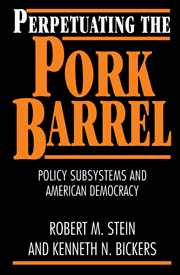Book contents
- Frontmatter
- Contents
- Tables and figures
- Acknowledgments
- PART I
- PART II
- PART III
- 4 A portfolio theory of policy subsystems
- 5 Policy subsystem adaptability and resilience in the Reagan period
- 6 PAC contributions and the distribution of domestic assistance programs
- 7 Congressional elections and the pork barrel
- PART IV
- APPENDIXES
- Notes
- Bibliography
- Index
7 - Congressional elections and the pork barrel
Published online by Cambridge University Press: 05 June 2012
- Frontmatter
- Contents
- Tables and figures
- Acknowledgments
- PART I
- PART II
- PART III
- 4 A portfolio theory of policy subsystems
- 5 Policy subsystem adaptability and resilience in the Reagan period
- 6 PAC contributions and the distribution of domestic assistance programs
- 7 Congressional elections and the pork barrel
- PART IV
- APPENDIXES
- Notes
- Bibliography
- Index
Summary
It is an enduring belief in American politics that legislators who “bring home the bacon” are rewarded for their efforts at the ballot box. This is reflected in the attention of the political science profession, which has invested heavily in explaining and testing for a relationship between the particularized benefits legislators secure for their districts and the electoral margins with which incumbents are reelected. Mayhew (1974), who first elaborated on the logic underlying the electoral connection with distributive policy benefits, observed that “how much particularized benefits count for at the polls is extraordinarily difficult to say, but it would be hard to find a Congressman who thinks he can afford to wait around until precise information is available. The lore is that they count” (p. 57).
We argue that the lore about the relationship between benefits and electoral support contains an important element of truth, which previous research may have failed to detect due to misconceptualization or misspecified empirical tests, or both. Following Fiorina (1981a:546–51, 556), we treat the relationship between distributive benefits and electoral support as dynamic over time and conditioned by institutional, partisan, and electoral differences among individual legislators. We argue, however, that a properly conceptualized view of the electoral connection must integrate both a macroview of the behavior of legislators and a microview of the responses of voters. In this chapter we develop an argument in which not all legislators have the same incentives to utilize their positions within policy subsystems to enhance their electoral margins.
- Type
- Chapter
- Information
- Perpetuating the Pork BarrelPolicy Subsystems and American Democracy, pp. 118 - 136Publisher: Cambridge University PressPrint publication year: 1995



